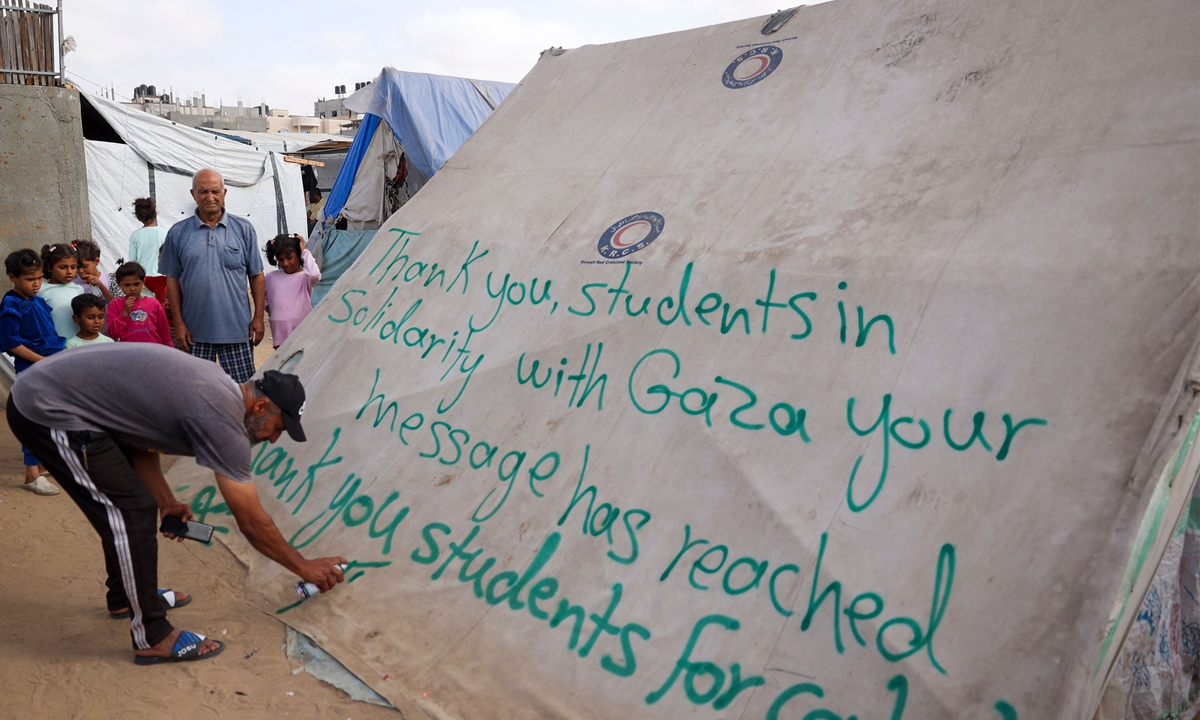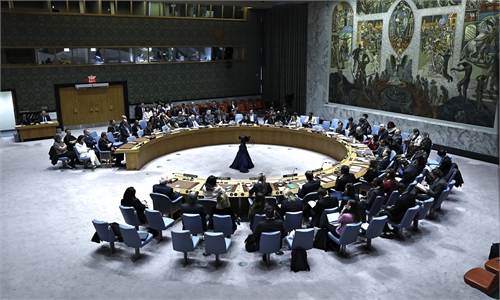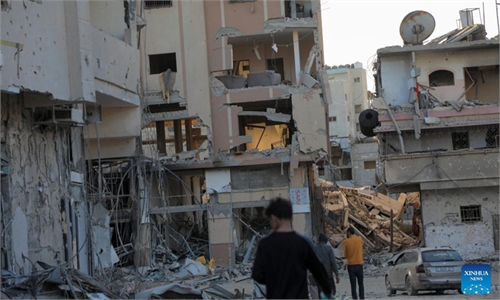Hamas delegation to visit Cairo for cease-fire talks, yet 'prospects slim'
Rafah invasion 'would mean more moral pressure and isolation against US, Israel’

A man writes a message of thanks to students in the US protesting in solidarity with the people of Gaza, on a tent at a camp for displaced Palestinians in Rafah, in the southern Gaza Strip on April 27, 2024, amid the ongoing conflict. Photo: VCG
Hopes remain slim of a Gaza cease-fire as a Hamas delegation is expected to visit Cairo, Egypt on Monday for talks, after the group said it is studying a reply from Israel over a cease-fire proposal. Analysts said that while both Israel and Hamas could benefit from a temporary cease-fire, it still lacks factors to be positive. Under the growing international and domestic protests, the moral pressure and diplomatic isolation of Israel and the US may deepen.
According to media reports, Hamas said in a Saturday statement that it has received Israel's official response to its latest cease-fire proposal in Gaza and will review it before submitting its reply, amid the latest efforts by Egypt as a broker.
Speaking on condition of anonymity, a Hamas official told Reuters on Sunday that a delegation will visit Cairo on Monday for Gaza cease-fire talks. And the group will deliver its response to Israel's latest counterproposal for a Gaza cease-fire.
During an interview with local media Channel 12 television earlier, Israeli Foreign Minister Israel Katz said the release of hostages is the "top priority," and if there is a deal with Hamas on it, "we will suspend the operation," according to a Reuters report on Saturday.
Citing two Israeli officials, Axios reported that Israel told Egyptian officials on Friday that it was ready to give hostage negotiations "one last chance" to reach a deal with Hamas before moving forward with a ground invasion of Rafah, where more than one million displaced Palestinians are sheltering due to the conflict, which has lasted more than six months.
Israel Defense Forces chief of staff General Herzi Halevi and director of the Shin Bet security agency Ronen Bar visited Cairo earlier for talks on the Rafah operation and the hostage deal, Axios reported.
The Israeli officials said the talks with the Egyptians on Friday were "constructive" and that the Egyptians made it clear they intend to put pressure on Hamas to secure a deal for the release of hostages, according to Axios. However, a Wall Street Journal report said on Saturday that talks toward a hostage deal had little chance of success, according to Egyptian officials familiar with the negotiations.
Chinese experts said there is demand on both sides for a cease-fire, but the prospects for an actual cease-fire are still bleak.
"Despite Hamas seeks a cease-fire when Rafah is almost their last stronghold in Gaza, the 'one last chance' claimed by Israel is also for themselves, as in the face of domestic pressure, they need Hamas to free as many hostages as possible before it attacks Rafah," said Niu Xinchun, executive director of the China-Arab Research Institute of Ningxia University.
Amid the efforts to break the deadlock, on Saturday, Hamas released a video of two hostages, which US media interpreted as a tactic to increase pressure on the Israeli government to reach a cease-fire deal.
Liu Zhongmin, a professor at the Middle East Studies Institute of Shanghai International Studies University, believes that the possibility of reaching a cease-fire deal is still limited, especially regarding the attitude from Qatar, a major mediator that has been promoting a cease-fire since last November.
Qatari Prime Minister Sheikh Mohammed bin Abdulrahman Al Thani, who is also foreign minister, said there was a "misuse of this mediation for narrow political interests, and this necessitated Qatar to undertake a full evaluation of this role."
In an interview with Israeli media Haaretz published on Saturday, Qatar's Ministry of Foreign Affairs spokesperson Majed Al-Ansari said that the Israel and Hamas "are not showing enough commitment" to reach a cease-fire and a hostage release deal, and "it gets sabotaged by both sides" when a deal gets close.
Qatar's attitude illustrates how difficult the task of brokering a cease-fire will be, Liu said.
Cease-fire talks between Hamas and Israel since the conflict broke out last October, have been more about hostage release and humanitarian aid, but they have never touched on the fundamentals of a permanent cease-fire. It means it is just about short-term expediency, Liu said.
The Hamas side wants a complete cease-fire, and the Israelis want a complete elimination of Hamas, and that has not changed, Liu said.
By claiming "one last chance," Israel is aiming to put more blame on Hamas and ease its pressure in the diplomatic sphere, especially after a top Hamas official said they will agree to a truce of five years or more and that it would lay down its weapons if an independent Palestinian state is established along pre-1967 borders, Liu said.
Growing pressure
The cease-fire deadlock comes alongside a summit attended by regional and global leaders in Saudi Arabia, including US Secretary of State Antony Blinken and Palestinian President Mahmoud Abbas.
Speaking at a World Economic Forum (WEF) special meeting in Riyadh on Sunday, Abbas urged the US to ask Israel to stop the Rafah invasion, as the US "is the only country capable of preventing Israel from committing this crime," which would be "the biggest disaster in the history of the Palestinian people."
Citing diplomats, Reuters said on Friday that China will host Palestinian unity talks between Hamas and Fatah in Beijing.
An Israeli attack on Rafah, which has been the main channel of outside aid into Gaza in the past six months, would be a further humanitarian disaster, Niu said.
According to the Gaza health ministry on Sunday, Israeli's war in Gaza has killed at least 34,454 Palestinians since last October.
Israel now faces a dilemma: with increasing diplomatic isolation and moral pressure from the international community, Israel must find some way to protect the over 1 million Palestinians in Rafah and even arrange for the transfer of civilians, but on the other hand, it is still unwilling to give ground on stopping the military operation in Gaza, Liu said.
Whether or not a cease-fire is reached, Israel may opt for a compromise in the next phase of the conflict, Liu said, noting that Israel may keep up its partial bombardment of Gaza, but the large-scale invasion in Rafah may be postponed.
Despite the Biden Administration warning Israel against a possible Rafah invasion, US President Joe Biden on Wednesday signed legislation that includes $26 billion in additional wartime assistance to Israel.
After more than 100 protesters at Columbia University in New York City were arrested, student protests over the Israel-Hamas war have spread to other campuses, with more university students rallying for a cease-fire in Gaza. Pro-Palestine demonstration have occurred in London and Paris in recent days.
To some extent, the growing campus protests in the US are a result of US duplicity and hypocrisy, which would put more pressure and cause dilemma for the US, Liu said.
In fact, the US and Israel have the same fundamental interests and war objectives, and the US still supports Israel to completely eliminate Hamas, which means a Rafah invasion is inevitable, Niu said.


